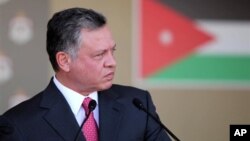STATE DEPARTMENT —
The United States is supporting long-time ally, Jordanian King Abdullah, who is facing protests over higher fuel prices. King Abdullah's political opponents are boycotting January's parliamentary vote because of an electoral law that they say favors the monarch's supporters.
Jordan's government says higher prices for heating and cooking gas are needed to shrink its budget deficit and secure a $2 billion loan from the International Monetary Fund.
The announcement sparked protests across the kingdom, where there have been increasingly-frequent anti-government demonstrations during the past two years, spurred in part by changes to electoral laws.
King Abdullah has outlined a series of reforms, including greater parliamentary powers and broader civil liberties. But most of his leading opponents are refusing to take part in January's parliamentary elections because they say the new rules make it harder for them to win seats.
U.S. State Department Spokesman Mark Toner says the Obama administration believes King Abdullah is on the right track despite the protests.
"We call on protestors to do so peacefully. We support King Abdullah II's roadmap for reform and the aspirations of the Jordanian people to foster a more inclusive political process that will promote security, stability as well as economic development," Toner said.
Officially, unemployment in Jordan is between 12 and 14 percent. But experts say it could be as high as 30 percent. Jordan's national debt is equal to about 10 percent of the country's Gross Domestic Product, underscoring the kingdom's need for new IMF loans.
"There are concerns -- economic, political concerns, aspirations -- by the Jordanian people. We believe that King Abdullah's roadmap for reform addresses these. But certainly, as we've seen elsewhere, there is a thirst for change," the spokesman said.
Analysts say that public discontent in Jordan comes at a crucial time in the region, with Syrian rebels fighting troops loyal to embattled President Bashar al-Assad. Some of the violence has spilled across the border into Lebanon. More than 88,000 Syrian refugees have fled to Jordan.
Jordan's government says higher prices for heating and cooking gas are needed to shrink its budget deficit and secure a $2 billion loan from the International Monetary Fund.
The announcement sparked protests across the kingdom, where there have been increasingly-frequent anti-government demonstrations during the past two years, spurred in part by changes to electoral laws.
King Abdullah has outlined a series of reforms, including greater parliamentary powers and broader civil liberties. But most of his leading opponents are refusing to take part in January's parliamentary elections because they say the new rules make it harder for them to win seats.
U.S. State Department Spokesman Mark Toner says the Obama administration believes King Abdullah is on the right track despite the protests.
"We call on protestors to do so peacefully. We support King Abdullah II's roadmap for reform and the aspirations of the Jordanian people to foster a more inclusive political process that will promote security, stability as well as economic development," Toner said.
Officially, unemployment in Jordan is between 12 and 14 percent. But experts say it could be as high as 30 percent. Jordan's national debt is equal to about 10 percent of the country's Gross Domestic Product, underscoring the kingdom's need for new IMF loans.
"There are concerns -- economic, political concerns, aspirations -- by the Jordanian people. We believe that King Abdullah's roadmap for reform addresses these. But certainly, as we've seen elsewhere, there is a thirst for change," the spokesman said.
Analysts say that public discontent in Jordan comes at a crucial time in the region, with Syrian rebels fighting troops loyal to embattled President Bashar al-Assad. Some of the violence has spilled across the border into Lebanon. More than 88,000 Syrian refugees have fled to Jordan.




